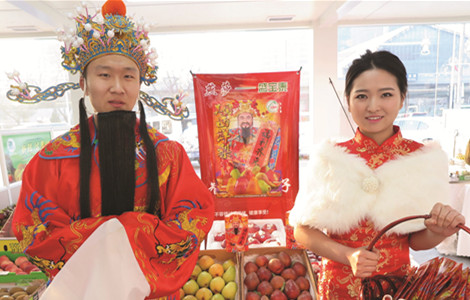Innovation bright spot as economy slows down
Updated: 2015-02-23 13:40
By Zhang Yuchen(China Daily USA)
|
||||||||
If there is a concave relationship between well-being and income, inequality, disruption, corruption, crime, commuting times and so on – so that higher income increases well-being at a decreasing rate, but a convex relationship between well-being and pollution – so that higher pollution reduces well-being at an increasing rate, then there is an optimal growth rate beyond which higher growth "is not worth it", said Clark.
China now faces primary tasks of optimizing the structure of demand, especially consumer demand to expand domestic economic growth, aiming to enhance the ability of green development and innovation.
Last year, with GDP growth rate lowering, value added services contributing to GDP ratio increased to 48.2 percent, 5 percentage points higher than that in 2010, the sharpest increase over the past 10 years, thus forming a service-oriented modern industrial system.
China has already seen the return on human capital or dividends with the state education budget to GDP ratio reaching 4.28 percent, in a timely completion of set target in 2012. The country's college population rose from 119 million in 2010 to 143 million in 2013, an increase of 24 million, or 20.2 percent. In 2015, it is expected to top 160 million.
Despite the slowdown in growth, the numbers indicate that China shows no signs of a slowdown in the general population’s pursuit of happiness.
In late January, the first multi-discipline workshop on happiness in China brought together researchers presenting the academic works of economists, psychologists, legal scholars, and philosophers from universities in China, Germany and the US.
Very rapid growth and economic change come with uncertainty and with increases in inequality, among other things, which make people unhappy, at least in the short term. Inequality remains an issue in China, as does the status of migrants who retain agricultural household status or other kinds of stability happier than their counterparts who do not.
Employment quality and stability are also issues, with public servants displaying higher levels of well-being than other groups, and with a wide number of respondents suffering the negative effects of not enough rest and lack of leisure time.
"As such, the role of the government in promoting employment is central. But we could also make the same argument with respect to housing and migration, or social capital, to name only two others," said Clark.
In 2011, China created 12.2 million jobs for people working in urban areas. In 2014, that number climbed to 13.2 million. During that period, from 2011 to 2014, the average number was 12.8 million. The registered unemployment rate stood at 4.1 percent, lower than an initially estimated 5 percent.
China has demonstrated a number of growth paradoxes, as studies showed, during past decades in which its open market sparked economic growth. The paradox of unhappy growth, which has been found in other countries, however, is not unique to China.
"What is unique about China is how rapid the change and development and how many people were affected. Not a surprise, then, that the life satisfaction trends are particularly stark. Over time as the benefits of development become clear and things even out, then life satisfaction usually recovers," said Carol Graham, the Leo Pasvolsky Senior Fellow at the Brookings Institution, at the first workshop on multi-disciplinary perspectives on the study of happiness in China held in January.
There is a change versus levels effect. Rapid growth brings a lot of uncertainty, inequality, uneven development, environmental issues, and more.
"As they have in China, albeit with differences across cohorts, these progress paradoxes should resolve over time – and could be resolved more quickly with the attention of policymakers – and help explain China’s coincidence of decreasing happiness and rising growth," said Graham. "Over time, as things stabilize and the benefits of more generalized prosperity are clear, happiness levels usually recover."
-
 Texas Lunar Festival fun
Texas Lunar Festival fun 
 'God of Wealth' promotes US pears
'God of Wealth' promotes US pears
 Stars arrive at 87th Academy Awards
Stars arrive at 87th Academy Awards
 Man's best friend: border soldiers and a military dog
Man's best friend: border soldiers and a military dog
 Couple sentries guard China's northern border during traditional holiday
Couple sentries guard China's northern border during traditional holiday
 Another winter storm to pummel eastern United States
Another winter storm to pummel eastern United States
 2015 Film Independent Spirit Awards
2015 Film Independent Spirit Awards
 Beautiful sceneries of early spring flowers around China
Beautiful sceneries of early spring flowers around China
Most Viewed
Editor's Picks

|

|

|

|

|

|
Today's Top News
Savoring benefits of medicinal foods
Alejandro G. Inarritu wins Best Director for 'Birdman'
Chinese enjoy shopping, massages and travel to ring in New Year
Foreign minister to preside at UN
Innovation bright spot as economy slows down
Ballet appreciated as form of valuable cultural exchange
Climate pact offers improved relations
Four Chinese among top 100 for Mars One project
US Weekly

|

|







